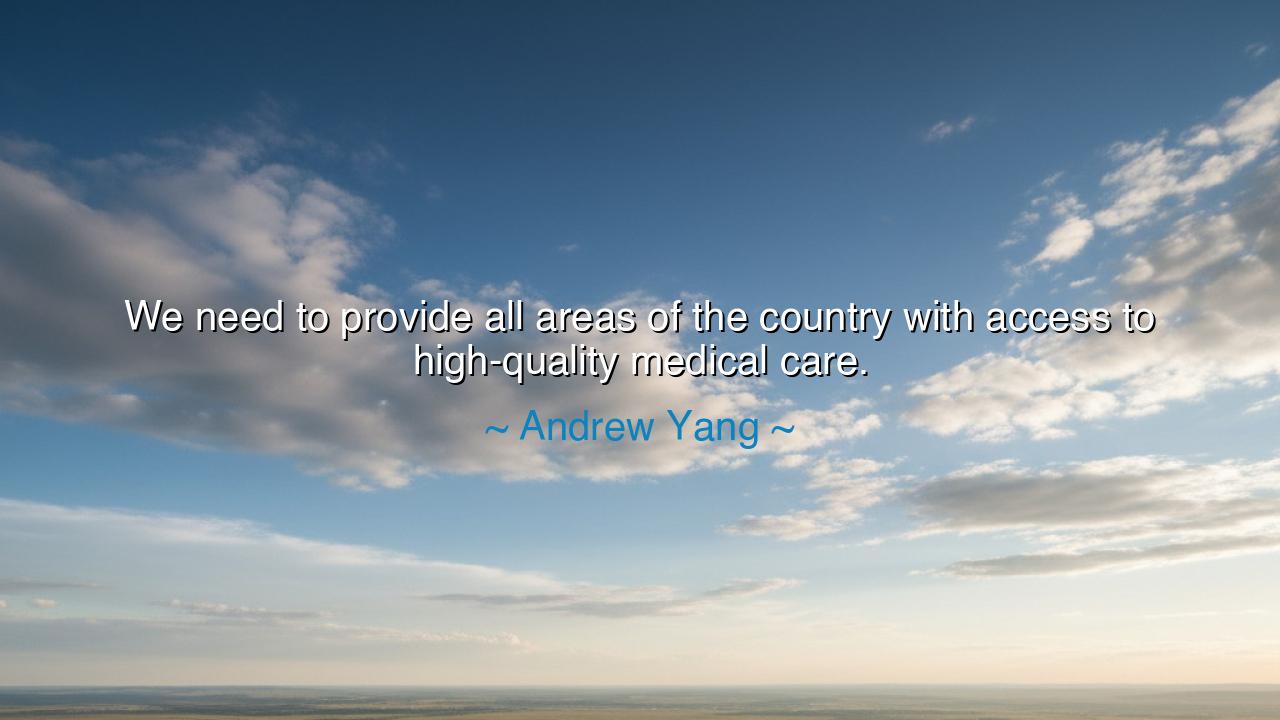
We need to provide all areas of the country with access to






The words of Andrew Yang flow like a clear river of truth through the valleys of a weary land: “We need to provide all areas of the country with access to high-quality medical care.” Though simple, these words carry the weight of compassion, justice, and foresight. They are a plea and a prophecy—a reminder that the health of a nation is not measured by the wealth of its cities, but by the well-being of its most distant villages. To deny care to some is to wound the whole; for a nation divided in health cannot stand united in spirit.
In the age of empires and kingdoms, the wise rulers knew that sickness among the poor foretold weakness in the realm. When pestilence struck the countryside, even the palace trembled. Yet in our modern time, when knowledge is vast and medicine a marvel, we still find deserts of healing—places where hospitals are scarce, where doctors are few, and where the suffering wait in silence. Yang’s words are not political alone—they are moral. They summon us to remember that health is not a privilege bestowed by fortune, but a right born of our shared humanity.
Think upon the story of Dr. Elizabeth Blackwell, the first woman to receive a medical degree in America. She saw not glory but duty in her calling. When epidemics spread through poor neighborhoods, she did not retreat to comfort; she went where the need was greatest. In the slums of New York, where the air itself seemed to choke with despair, she established clinics for women and children—those who had been forgotten by the great hospitals of wealth. Through her courage, she taught a timeless lesson: that medicine must walk hand in hand with mercy, and that healing withheld from the poor is no healing at all.
So too must the nation heed this ancient principle—that the measure of its greatness lies not in its tallest towers, but in its compassion for the distant and unseen. The farmer in the plains, the miner in the mountains, the teacher in the small-town school—all are threads in the same fabric of life. If one suffers without remedy, the cloth unravels. High-quality medical care is not merely treatment of disease—it is an affirmation of worth, a declaration that every human soul, no matter how remote, deserves to live without fear of being abandoned to pain.
In every age, there are those who say that such dreams are too costly, too ambitious. But the ancients knew that the greatest cost is indifference. The wealth of a nation lies not in its treasuries but in its people—their strength, their hope, their ability to rise each morning and labor for the good of all. To build a system of universal care is to invest not in luxury, but in life itself. The physician’s touch, the nurse’s kindness, the medicine delivered to a forgotten town—these are the true marks of civilization.
Let us not forget the words of Florence Nightingale, who walked among the dying soldiers of the Crimean War, carrying her lamp through the night. She did not ask whether they were rich or poor, powerful or nameless. She saw only the suffering, and she healed. Her light became a symbol of humanity’s duty to itself—the duty to bring care wherever pain resides. In that spirit, Andrew Yang’s vision echoes hers across time: that the lamp of healing must shine in every corner of the land.
And so, my child of tomorrow, take this lesson to heart. Wherever you stand—in city or countryside—remember that the health of one is the health of all. Do not turn away from the sick or the neglected; instead, bring your strength, your skill, your voice to their aid. Support those who labor to expand access to care, who bring doctors to the underserved, who build bridges between science and compassion. For in healing others, we heal the nation’s soul.
In the end, the message is eternal: justice begins in compassion, and compassion begins in care. When every village has a healer, when every heart has hope, when every life can reach the hands of those who heal—then, and only then, will we call ourselves truly civilized. Let this be our vow: to carry the light of medicine into every shadow, until no place, and no person, is left beyond its reach.






AAdministratorAdministrator
Welcome, honored guests. Please leave a comment, we will respond soon